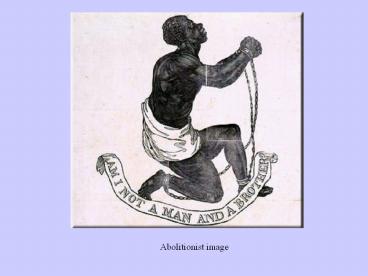Compromise of 1850 - key points - PowerPoint PPT Presentation
Title:
Compromise of 1850 - key points
Description:
Abolitionism, 1820-1850, pt.1 1820 s: diffusion theory popular, ACS begins to move freed slaves back to Africa 2nd GA brings moral & social dynamic to anti ... – PowerPoint PPT presentation
Number of Views:197
Avg rating:3.0/5.0
Title: Compromise of 1850 - key points
1
Abolitionist image
2
Abolitionism, 1820-1850, pt.1
- 1820s diffusion theory popular, ACS begins to
move freed slaves back to Africa - 2nd GA brings moral social dynamic to
anti-slavery in late 1820s and 1830s - antislavery is energized w/The Liberator in 1831
- Abolitionist ideology
- need clear immediate freedom for slaves
- laws alowing slavery are morally wrong
- slavery does not fit w/Constitution or bible
- Northerners obligated to end slavery everywhere
it exists
3
Anti-abolitionist posting
Abolitionist school reader
4
Abolitionism 1820-1850, pt.2
- 1833- English abolition of slavery spurs momentum
- Abolitionism has effective leadership by 1840s
Douglass, Child, Garrison, Truth - political organization literature campaign leads
to Gag rule in Congress, 1836 - Liberty party, then Free Soilers emerge as a
political force in 1840s - abolitionist success leads to reaction in the
South the pro-slavery argument
5
Pro-Slavery argument, 1830-1865
- Abolitionist argument leads to argument that
slavery is positive for all involved - Slaves treated as family by slaveowners
- no free-market competition that leads to
exploitation, as in North - blacks are biologically suited for slavery
- slavery important to western culture democracy
(re Greeks, Romans, etc.) - slavery is biblically-mandated
- slave societies harmonious, peaceful
6
Compromise of 1850 - key points
- political deal struck bet. North South to
settle question of new western territories - S. Douglas, Clay, Calhoun Webster lead
Congressional efforts - vagueness in decision on Utah New Mexico --
all rightful subjects...consistent with the
Constitution. - Fugitive Slave Law causes a great deal of
tension, conflict as it is enforced - Does this settle the issue or intensify it?
7
Reaction to Fugitive Slave Law Boston, 1851
8
Brooks canes Sumner, 1856
9
1850s tension - p.1
- Uncle Toms Cabin - 1852 adds tremendous
support to anti-slavery effortshttp//www.iath.vi
rginia.edu/utc/index2f.html - Kansas-Nebraska, 1854 - Stephen Douglas
compromise- ends Missouri Compromise - 1854 Republicans Free Soil, Free Labor, Free
Men Northern party - KS-NB Act allows pop. sovereignty
- political realignment after KS-NB Republican
Party formed, Democrats split by section
10
1850s tension, p.2
- 1856- Sumner-Brooks episode further escalates
sectional tension - 1855-1856 bleeding Kansas - violence over
slavery issue - http//www.assumption.edu/ahc/Kans
as/default.html - admission of KS as a state John Brown emerges
as abolitionist, pre-cursor to war - 1857 - Dred Scott blacks no citizenship
- Decision intensifies North anger v. slave power
11
1850s Sectionalism Editorials































